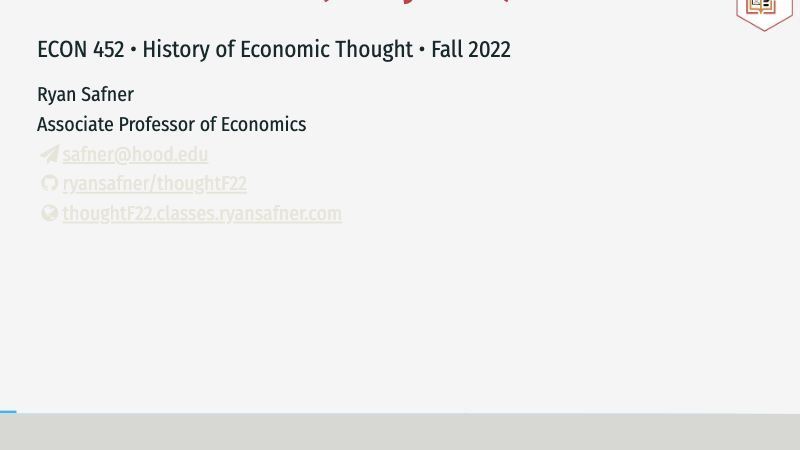1.3 — Ancient Writers (Mostly Greek) — Class Content
Overview
We begin our first look at some of the earliest writings about economics. None of these writers was self-consciously “an economist” or saw themselves as writing “about econonomics,”1 but it is pretty clear they occasionally touch on economic subjects.
While I have not assigned any Plato to you2, you should familiarize yourself briefly with Plato’s more famous claims and view of “the ideal State.”
A note of caution in reading Plato: Plato was the student of the famous Socrates (who did not write anything down), and he writes in dialogues, often between his Socrates character and other famous Greek contemporaries.
Aristotle - who was Plato’s greatest student - writes often in opposition to Plato’s views. Thus, it is useful to know what Aristotle is referring to.
Readings
Required Readings
- Part I (Pre-classical Thought) Introduction, Aristotle, Politics & Nicomachean Ethics in Medema & Samuels (Reader)
- Ch.2 (Early Preclassical Economic Thought) in Landreth & Colander
Blaug unfortunately does not cover anything before mercantilism & the physiocrats.
Recommended Readings:
The following Wikipedia entries can also provide more background on these writers and their famous works:
Questions to Help Your Reading
- How much of these writings are meant to be normative vs. positive?
- What economic concepts or principles can you find in these writings?
- What can we glean of Aristotle’s method or methodology? How does he approach the subjects he writes about and get us to learn something from them?
- What is the State, according to Aristotle? What are its origins and purpose? What is the relationship between the State and an individual?
- What does Aristotle have to say about property? What about property held “in common” versus “private” property?
- What the role of “equality” or “reciprocality” in exchange?
- What is the purpose, origin, and nature of money?
- What aspects of “the art of wealth-getting” are “natural” and what are “unnatural?”
Slides
Below, you can find the slides in two formats. Clicking the image will bring you to the html version of the slides in a new tab. The lower button will allow you to download a PDF version of the slides.
You can type h to see a special list of viewing options, and type o for an outline view of all the slides.
I suggest printing the slides beforehand and using them to take additional notes in class (not everything is in the slides)!
Assignments
Participation/Discussion Board Posts Due 8 PM Fri Sep 2
This week’s graded discussion is worth 5 points, and can be a combination of discussion in class, and/or posts on the Blackboard Discussion Board by 8 PM this Friday September 2.
